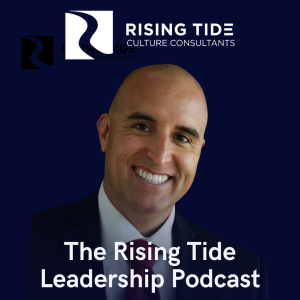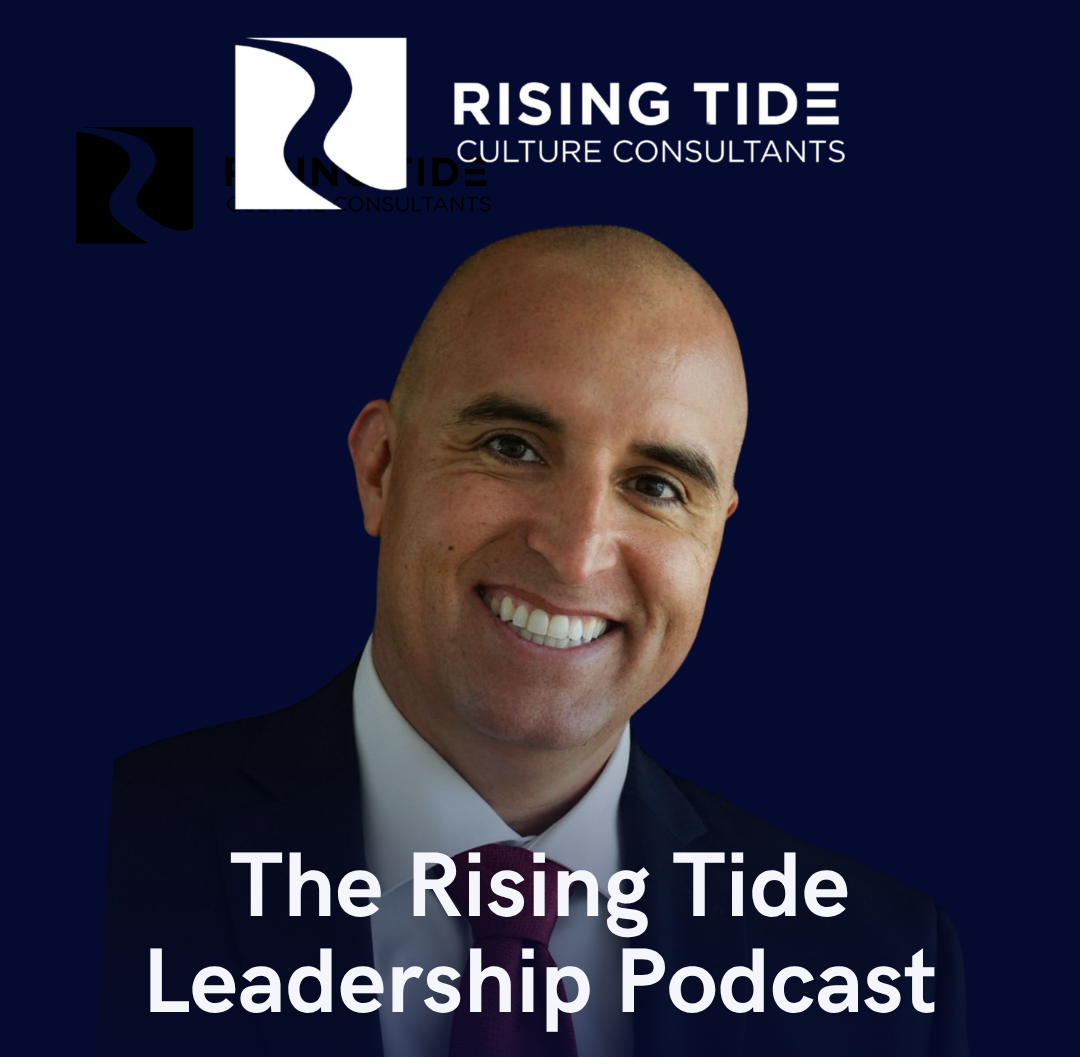Episodes

Monday Sep 29, 2025
The Untold Power of Leading as an Introvert | Gregory Weinger (Ep. 128)
Monday Sep 29, 2025
Monday Sep 29, 2025
In this episode of the Rising Tide Leadership Podcast, MO sits down with Gregory Weinger to uncover the hidden strengths of introverted leaders. From quiet influence to building deep trust, Gregory reveals how leaders can thrive without being the loudest voice in the room. 💡 Whether you’re introverted or extroverted, this conversation will challenge how you think about leadership. Can silence truly be a superpower in leadership? 🤔 #LeadershipPodcast #IntrovertLeadership #GregoryWeinger #QuietLeadership #LeadWithInfluence #LeadershipDevelopment #TeamCulture #AuthenticLeadership #LeadershipTips #risingtideleadership
https://www.linkedin.com/in/gregoryweinger/

Monday Sep 22, 2025
Monday Sep 22, 2025
What does it take to be a truly strategic leader? 🤔 Join Mo as he sits down with leadership advisor, speaker, and author Ash Seddeek to uncover the secrets of executive presence, the art of storytelling, and how to inspire teams with passion and clarity. From Silicon Valley to small business, these lessons will challenge how you lead and influence.
🌍 Are you ready to rethink your leadership?
#Leadership #AshSeddeek #Storytelling #ExecutivePresence #StrategicLeadership #Influence #LeadershipDevelopment #PublicSpeaking #FaithAndLeadership #risingtideleadership
https://www.linkedin.com/in/ashseddeek/
P.S. If you’re enjoying the content here and want to see more, consider buying me a coffee! Your support helps keep the ideas flowing and allows me to create even more valuable content. Every cup goes a long way in fueling future posts, so if you can, I’d genuinely appreciate your contribution. Thanks for reading and for helping me keep this journey going!
More of MO:
www.youtube.com/risingtideleadership
https://buymeacoffee.com/risingtide.mo
https://podcasts.apple.com/us/podcast/rising-tide-leadership-podcast/id1546034213
https://open.spotify.com/show/2jUqyH9hTOamOIOAxcO6yH?si=9d0ff2c2b2ae4289

Friday Sep 19, 2025
Friday Sep 19, 2025
Riley Smith of Propeller joins the Rising Tide Leadership Podcast to unpack what it really takes for leaders to move from strategy to execution. 🚀 We dive into change management, building high-performing teams, and the power of visible leadership that earns trust.
💡 If your people aren’t following with energy, are you truly leading—or just managing?
#LeadershipPodcast #ChangeManagement #StrategyExecution #RileySmith #PropellerConsulting #HighPerformingTeams #VisibleLeadership #TeamBuilding #LeadershipDevelopment #influentialleadership

Wednesday Sep 17, 2025
I’m Not Mad at You: Stacey Bullman on Brutal Honesty in Leadership (Ep. 125)
Wednesday Sep 17, 2025
Wednesday Sep 17, 2025
In this episode, Mo sits down with Stacey Bullman, founder of I’m Not Mad at You, to uncover why leaders avoid the numbers, how brutal honesty can unlock growth, and why your team might secretly score you lower than you think 😳
From P&Ls to the Wheel Assessment, Stacey shows how clarity beats clutter every time. Ready to face the truth about your leadership?
#LeadershipPodcast #StaceyBullman #LeadershipTruth #BusinessGrowth #CutThroughTheClutter #LeadershipDevelopment #HonestLeadership #LeadershipMatters #LeadWithClarity #RisingTideLeadership
Youtube: @imnotmadatyou3397
Instagram: imnotmadatyou_
Facebook: imnotmadatyou
LinkedIN: Stacey Bullman

Monday Sep 15, 2025
Monday Sep 15, 2025
Rick Bulman has spent 30+ years leading in both ministry and business — and now he’s on a mission to help pastors and leaders fight burnout with ChurchHub.ai. From shifting from positional leadership to permission leadership, to learning how to lead with resilience and humility, Rick shares wisdom you won’t want to miss.
⚡ Are you leading with ego… or with permission?
#LeadershipPodcast #RickBulman #ChurchLeadership #BurnoutPrevention #LeadershipLessons #AIandMinistry #PermissionLeadership #FaithAndLeadership #PastorLife #RisingTideLeadership

Thursday Sep 11, 2025
Leading Through Trauma: Can HEART Beat Burnout? | Hanna Bauer (Ep. 123)
Thursday Sep 11, 2025
Thursday Sep 11, 2025
What happens when love and excellence collide in leadership? ❤️💡 In this episode, Hanna Bauer shares how surviving a groundbreaking heart procedure shaped her mission to help leaders thrive without burning out. We dive into resilience, HEART-based leadership, and her book Hustle with HEART. Can small shifts really transform your leadership journey? 🤔
#LeadershipPodcast #HannaBauer #Heartnomics #HustleWithHeart #ResilientLeadership #ServantLeadership #LeadershipDevelopment #BusinessTransformation #LeadershipJourney #LeadWithLove
https://www.linkedin.com/in/bauerhanna/
https://youtu.be/2gayfWDaqwc?si=my5GYyvss43IRBah

Monday Sep 08, 2025
Why Most Leaders Never Earn True Buy-In (Ep. 122)
Monday Sep 08, 2025
Monday Sep 08, 2025
https://www.instagram.comPatagonia said “yes” when others would’ve played it safe. Popovich celebrated failure when others would’ve yelled. And Scott & MO are diving into why trust, buy-in, and celebrating the tries are the secret sauce to leadership 🍕🔥.
Whether you’re leading a team, a business, or a locker room—this episode will challenge how you think about people, innovation, and success. So here’s the real question: Are you brave enough to loosen your grip?
#LeadershipPodcast #InnovationLeadership #TrustAndLeadership #CelebrateFailure #PatagoniaStory #GregPopovich #TeamBuyIn #LeadershipDevelopment #PeopleFirstLeadership #CreativeLeadership

Wednesday Sep 03, 2025
Rethinking the First 90 Days of Leadership | Natasha Kehimkar (Ep. 121)
Wednesday Sep 03, 2025
Wednesday Sep 03, 2025
Stepping into a new leadership role? 🚀 Most leaders rush in, chase quick wins, and miss the chance to build trust and align their team from day one. In this episode, Natasha Kehimkar shares the secrets to successful leader transitions, powerful team kickoffs, and creating real belonging—even after mergers and acquisitions. Ready to stop “hitting the ground running” and start leading smarter?
🌊 What’s your first move as a new leader?
#LeadershipPodcast #NewLeader #LeadershipTransition #ExecutiveCoaching #TeamAlignment #LeadershipDevelopment #CultureOfTrust #First90Days #LeadershipJourney #NatashaKehimkar

Monday Sep 01, 2025
From Public Collapse to Leadership Comeback | Alfredo Borodowski (Ep. 120)
Monday Sep 01, 2025
Monday Sep 01, 2025
What happens when everything falls apart—and you have to rebuild not just your career, but yourself? Alfredo Borodowski went from “The Road Rage Rabbi” splashed across global headlines to a leadership coach helping CEOs unlock resilience, trust, and purpose. His formula? Positivity + Purpose = Peak Performance. Are you leading to fix your people… or to nourish them? 🌱✨
#LeadershipPodcast #PositivePsychology #ResilientLeadership #LeadershipDevelopment #WorkplaceCulture #LeadershipTrust #LeadershipJourney #LeadershipGrowth #AuthenticLeadership #leadershipcoaching
https://www.linkedin.com/in/alfredo-borodowski/

Wednesday Aug 27, 2025
Failure, Joy, and the Real Work of Leadership | Hussein Hallak (Ep. 119)
Wednesday Aug 27, 2025
Wednesday Aug 27, 2025
What happens when leadership isn’t about having all the answers but knowing when to step in… and when to step back? 🤔 Join Mo and special guest Hussein Hallak, author of The Dark Art of Life Mastery, as they unpack failure, joy, and the “leadership dance.” This conversation will challenge your view of control, mastery, and empowerment. Are you ready to lead differently? 🌊🔥
#LeadershipPodcast #HusseinHallak #LifeMastery #LeadershipLessons #Entrepreneurship #Empowerment #LeadershipDevelopment #PersonalGrowth #FailForward #risingtideleadership

